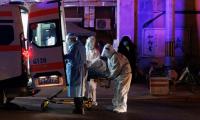rational state, much less a rational democracy – should lie in the roll of the dice of the next elections. Let the people’s court, supposedly the highest court but we know what the truth of this illusion is, render its verdict. If the people are tired of the existing parties, as pundits with no connection to practical politics say they are, let there be a search for alternatives. Now is the time to head the gathering storm...that is, if there is such a storm.
Indian corruption – consider only the 2G or telecom scandal – dwarfs any concept of corruption we may have in this country. Yet no one in India says the army should step in and cleanse the national stables.
Three years of this dispensation are already over (a minor miracle in itself). A year remains, after which we will be in election year. Then let any new knights waiting in the wings (although it is hard to see any) take up the challenge of saving Pakistan...a challenge as fresh today as 63 years ago when Pakistan was born. We are forever saving ourselves...and screwing ourselves in the process.
If prophets of doom, suddenly emerging from the woodwork, are to be believed – and there is no telling if their grim warnings are on the mark or merely a symptom of their fantasies – we are about to screw ourselves again. If we are to take their warnings seriously, the army command, worried to death about the state of the economy and of things in general, is once again mulling over the prospect of – you’ve guessed it – saving the nation.
True, the national scene presents a chaotic picture. Religious forces, left in the wilderness after the 2008 elections, have suddenly discovered a cause in the blasphemy issue and are pumping it for all it is worth. The Raymond Davis affair – Americans sure know how to act foolishly – has become another national headache. The PIA strike adds to the picture of a nation in disarray. And we don’t need tutorials about the more deep-seated problems plaguing our rather vulnerable fortress of Islam.
But what’s the answer to this chaos? Army intervention which alarmist soothsayers are not only predicting but in some cases virtually encouraging, or a continuation of the present mess in the hope that this too will pass, as all things must, and that when elections come a relatively better alternative should be on offer?
My generation (baby boom 1950) has endured a lifetime of military adventures conducted ostensibly for the loftiest of motives only to see the country pay a heavy price for its Bonapartes and Caesars. Unnecessary wars and national humiliation, the alienation of East Pakistan, the preoccupation with strange strategic doctrines, have been some of the fruits of military interventionism. Do we need to go down this road again?
That the nation will not survive the loot and corruption of the present order is a storyline no different from the hoary chestnuts pulled out of the fire to justify earlier coups. The army already is managing war and peace issues with little input from the civilian sector. American visitors, military or civilian, conduct their more meaningful talks in GHQ, Rawalpindi, not the wan and tepid power centres of Islamabad.
The Supreme Court under the baton-ship of My Lord the twice-resurrected Iftikhar Chaudhry is playing an activist role in various matters, and rightly so. When political governments fail to act someone will take up the slack, either the military or the courts. And it is much better that the courts should perform this function rather than anyone else. This is how a democracy should function.
Let’s not forget another factor. A civilian government, its mantle however tattered and moth-eaten, provides a constitutional umbrella under which other institutions can function better than if left to their own devices. My Lord Iftikhar Chaudhry would be looked upon as an encumbrance and an irritation in a military-dominated order...the old problem of two swords in one scabbard. The army has been able to do what it has done in Swat and South Waziristan because it had political backing and because it was able to concentrate on the task at hand instead of being distracted by the task of running the country.
Of course we can do with better governance and less corruption and ineptitude. The Raymond Davis affair could have been handled better and PIA affairs under a managing director who shouldn’t be there – I saw him in the Defence Committee of the National Assembly two days ago and it wasn’t funny – shouldn’t have been allowed to come to the present pass. And surely there are better ways of running a presidency than slaughtering a black ram (bakra) every day to ward off the evil eye (I joke not).
But we are stuck with these things just as we are stuck with terrorism and the wages of religious extremism. If at all we are lucky – about which, as the shades of evening approach, I have my growing doubts – and we manage to turn things around it is not going to happen overnight. The harvests we are reaping were sown long ago.
Should we not show similar patience about our corrupt and creaking democracy? Or should we be patient about everything else and froth at the mouth only when it comes to weighing democracy in the scales?
Kemal Ataturk rallied the Turkish nation when he had been dismissed from the Ottoman army. Other commanders rallied to his standard but he himself mounted no putsch. All the elements comprising the Turkish resistance against foreign intervention, and the humiliating terms of the Treaty of Sevres, freely chose him as their leader. Gen de Gaulle created the Fifth Republic not when in uniform but long after he was out of it.
Saving Pakistan should begin by going to the Pakistani people, as Mustafa Kemal went to the Turkish people and de Gaulle to the people of France. The long trek into the heart of the Pakistani nation – there to forge and temper something new – who is going to undertake this journey?
Email: winlust@yahoo.com
Land disputes in Kurram date back to the 1930s, with conflicts over grazing rights and access to water
I do not know how things work at school these days, but in my time, we used to read short stories, underline difficult...
Uraan Pakistan initiative offers a roadmap to turn challenges into opportunities, transforming aspirations into...
Automation enables mass production of goods to achieve greater efficiencies and allows pricing them within purchasing...
Election results in other countries last year forced many rulers of past to taste fruits of their karma
On December 21, Trump unleashed fresh salvo, lambasting Panama for its "unfair" canal fees







